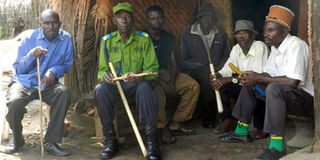Government asked to investigate royal guards

On duty. Rwenzururu royal guards at one of the royal shrines in Kasese District, recently. PHOTO BY MORIS MUMBERE
What you need to know:
- Watch them. District chairperson says the guards a more of a security threat.
- The meeting was organised by Kabarole Resource and Research Centre (KRC)
Bundibugyo. The Bundibugyo District chairperson has asked the government to investigate the endless recruitment of royal guards among cultural institutions in Rwenzori sub-region.
Mr Ronald Mutegeki wondered why cultural institutions in Rwenzori region are busy competing for the recruitment of royal guards instead of focusing on fostering development among their subjects.
“What does the law say about recruitment of royal guards of cultural instutions? We have police, UPDF and other security agencies and again hundreds of royal guards for what,” he wondered.
He allayed fears that unregulated royal guards will continue to disrupt the prevailing peace in the region.
The region is a hotbed of violent ethnic disputes.
The post-2016 election violence left more than 40 people dead and thousands displaced.
“How does a mere traditional royal guard begin checking a general, a brigadier? That is a very high level of impunity,” Mr Mutegeki said during a meeting for security agencies and other stakeholders from Bundibugyo and Ntoroko districts last Thursday held in Bundibugyo Town Council. The meeting was organised by Kabarole Resource and Research Centre (KRC).
He said for the region to rebuild a strong foundation of peaceful co-existence, cultural leaders, security personnel and the entire people of the Rwenzori sub-region need to cooperate and solve issues that can still trigger violence in the region.
The chairperson of the Rwenzori Nuyo Youth Patriotic Association (Rwenyope), an association of more than 500 youth who were given amnesty by the government after participating in the July 5, 2014 Killings in the Rwenzori region, Mr Vincent Bwambale, said his members refrained from any criminal act of violence and they are now participating in developmental activities for their future.
According to a report from the survey conducted by KRC, in the Rwenzori region, 50.4 per cent of people in the sub-region are afraid of police and 21.9% are afraid of people that are not from their tribe.




